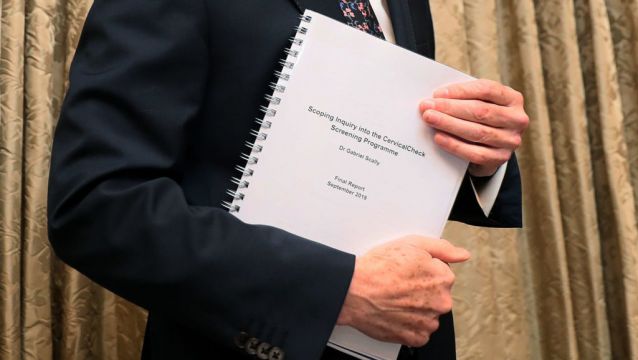The Minister for Health said that non-disclosure issues which arose in the cervical check screening controversy will be legislated for to prevent it from happening again.
Stephen Donnelly said new legislation will address the negligence issues and ensure that the failure to inform the women of the clinical audit of their screening will “never happen again”.
Mr Donnelly was discussing a number of amendments at the committee stage of the Patient Safety Bill.
The new legislation will require the mandatory open disclosure of serious patient safety incidents, and sets out a list of incidents which must be reported to the health watchdog, Health Information and Quality Authority (HIQA).
Mr Donnelly said that he will introduce an amendment at the report stage of the Bill that will provide for non-disclosure and will deal with issues around delayed diagnosis and delayed screening.
More than 200 women were affected by failures in Ireland’s CervicalCheck screening system.
It emerged in 2018 that 221 women and families were not told about misreported smear tests.
Mr Donnelly said: “I’ve had lengthy discussions with the department on this, and it doesn’t fit neatly with this Bill because the serious patient safety issues which result in death or serious harm, they are very clear and binary.
“Legislating around delayed diagnosis and delayed screening, it is really complex and doesn’t fit neatly in this Bill, however my view is that the non-disclosure that happened in cervical check, even though it doesn’t neatly fit here, should still be legislated for.
“So I have asked the department to find a way to do that. There has been extensive work and I will share the thinking with the committee.
“It’s something of an add on, it doesn’t really fit with the framework we have here.
“This is our opportunity to make sure what happened, that we are very clear under law, that that element of non-disclosure that happened in cervical check will now be covered under legislation.”

He added: “It’s tricky because you can have a discordance that is flagged, a discordance may or may not have been due to negligence, it might just be unfortunately the limitations of the system.
“A discordance in of itself is not necessarily a patient safety incident which is why it doesn’t neatly fit here so what we are looking to do is say, where discordance has been identified, it would become a legal obligation to disclose to the patient that it was found.
“That discordance may not end up being a patient safety incident, but I think this is the opportunity to address what happened and say that can’t ever happen again.”
Mr Donnelly also said he does not want to create a culture in the health service where people are “too afraid” to disclose serious patient safety incidents.
Mr Donnelly told the Oireachtas health committee that the “overarching intention” of the Bill is to embed and support a culture of open disclosure.
Pleased our Patient Safety Bill will go to Dail Committee Stage tomorrow. This Bill provides for mandatory open disclosure of serious patient safety incidents and extends the remit of Hiqa to private hospitals. It also contains provisions supporting clinical audit. pic.twitter.com/oj1cPPKAzB
— Stephen Donnelly (@DonnellyStephen) March 9, 2022
“This Bill provides for mandatory open disclosure of serious patient safety,” Mr Donnelly added.
“It provides for the notification of these reportable incidents to the relevant regulator, and it extends the remit of HIQA to private hospitals.
“It also contains provisions supporting clinical audit in the health service.
“This Bill will lead to a safer better health service by placing patients and their needs front and centre.”
He added: “The overarching intention of this Bill is to embed and support a culture of open disclosure.
“It’s also fair to say that many aspects of the Bill have been informed by the learnings from cervical check.
“In particular, the need to ensure accountability by service providers and clinicians in carrying out open disclosure to patients and families.
Sinn Féin’s David Cullinane raised concerns about who is mandated to raise the specified incidents.
He proposed an amendment to the Bill that would mandate any person employed in the health service to report an incident, which would broaden the scope of who is legally obliged to make a report.
“I think it’s really important that we get this right. I think it’s really important that any individual that has a sense that something is wrong and works in the healthcare service should be mandated to come forward,” Mr Cullinane added.
“I’ve spoken to a number of advocate groups in relation to this, we don’t want a situation where there is over-reporting and I think there’s a balance to be struck on it, and I do appreciate that.
“But, at the same time, I think we can put safeguards in place to protect the rights of healthcare staff who may well come forward, which is why the amendment allows for people to report the incident to HIQA, for example, as an alternative and as an added protection.
“Nobody should have any fear about coming forward in relation to their job, or their standing in the health services.”
However, Mr Donnelly warned about the effects or over-reporting if every staff member if legally bound to report an incident.
He added that there must be a right balance around accountability, but that it does not “come at the cost of creating a culture where people are afraid to step forward and admit that when things have gone wrong”.







